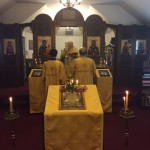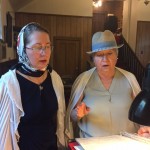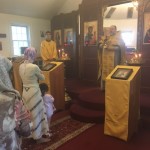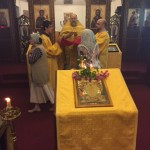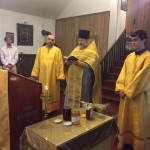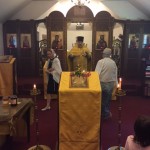On August 13, on the 10th Sunday after Pentecost, Rector of St. George Church, Archpriest Igor Tarasov served the Divine Liturgy at our parish temple. Following the Gospel reading he delivered the following homily in English:
“The Gospel lesson we heard today is telling about healing of a epileptic. At the question of the Holy Apostles why they were not able to cast the evil spirit out of that possessed boy, Christ answered: “Because of your unbelief; for assuredly, I say to you, if you have faith as a mustard seed, you will say to this mountain, “Move from here to there,” and it will move; and nothing will be impossible for you” (Mt. 17, 20). That’s what the Lord said. And he also added: “This kind does not go out except by prayer and fasting” (Mt. 17, 21). Thus today the Holy Gospel again reminds us about the importance of faith. It also reminds us about the importance of prayer and fasting.”
“Faith, prayer and fasting are the three important things for our spiritual life. In some way they determine our spiritual life in theory and in practice. A theory alone is not enough. Nowadays many people like to say that they believe “in their soul”, and prayers, rituals and participation in the Church life are not necessary for them. This is a hypocrisy and self-delusion. If we believe, our faith must be seen in our actions. Faith is dead without works, says Holy Apostle James (Jam. 2, 17). Therefore faith has to be manifested, first of all, it should be shown in prayer and fasting. Of course, it should be shown also on our moral life, in our warfare against sin. But sin is often conquered only by prayer and fasting. The same way as the evil spirits are cast out by prayer and fasting, our sinful inclinations, our passions and sinful habits should be conquered by prayer and by fasting. A theory alone, a declaration that we believe would be insufficient here.”
“The Lord did not just say about the importance of prayer, but He showed us a personal example of a prayerful life. Recently we read that after a miraculous feeding of the five thousand men by five loaves the Lord “went up on the mountain by Himself to pray. Now when evening came, He was alone there” (Mt. 14, 23). He was praying there the whole night, and only before dawn He went to His Disciples walking on the sea.”
“Why did Lord Jesus Christ need to pray? He was the Almighty God – why did He need to pray? And for what did He pray? He had a great need and a great care – He was praying for the human race and for His Church on earth. The difficulty of the endeavor of the Lord Jesus Christ was that His preaching was addressed to the free will of the people. The Lord prayed for His Disciples whom He patiently taught, making them understanding His Kingdom. He prayed for the future Church, for all of us that by our free will we may stay in His truth. He prayed as a Man leading us to the Kingdom of God.”
“Jesus also prayed a special prayer in the Olive Garden before His crucifixion that He had to undergo for our salvation. Then His soul had been suffering an agony. The Gospel says, “And being in agony, He prayed more earnestly. Then His sweat became like great drops of blood falling down to the ground” (Lk. 22, 44). Some Church Fathers consider that prayer to be the beginning of our Redemption (or even our very Redemption itself).”
“Teaching us to pray by His own example, the Lord also showed us some teachers of prayer among us – the people who fervently prayed. For instance, the Canaanite woman insisted in her fervent prayer and humbly asked Jesus about a healing. And the Lord very often listened to the prayers of such people and granted their requests according to their faith.”
“Fasting has the same powerful meaning as prayer. The Lord Himself showed us an example of fasting when He fasted forty days in the wilderness before His ministry. Again, we may ask: why did Jesus, who was God, need to fast? From what had He cleanse Himself if He was pure? What did He have to fight if He was without sin? The Lord fasted to show us an example and to overcome the temptation of the devil and to make him ashamed. And the Lord fasted to show His human nature. The Scripture says that after fasting Jesus became hungry (Mt. 4, 2). Christ was the true Man, He needed food. And the devil dared to tempt Him as a Man. And the Lord showed us that He was fasting and He was hungry, so we may not make a mistake like some heretics who thought that Christ only seemed to be a man. No, He was a true Man who needed to eat and was tempted but overcame the temptation.”
“Therefore, dear brothers and sisters, let us practice prayer and fasting, so our faith may be living and manifested in our actions. And one more thing. When we hear about a firm faith capable of moving the mountains, we may think that Christianity is a very hard religion. We conceive that Christ is standing on the top of a high mountain and is calling us out, the weak and infirm, to climb to Him, to become almighty and perfect. And we are not able to do so because we are weak and imperfect. This is a false image of Christ. He does not stand on a summit waiting for us to climb up to Him. He comes down to meet each climber on the mountain. He walks beside us. He holds our hand. He helps us to the summit. Without Him we would never reach it.”
“Let us then fervently pray the merciful Savior and our God that He may comfort our faith and give us a strength to live in prayer and fasting, so along with Christ we may overcome the evil power and the sin in our lives and conquer any mountains standing on our way.”
After the dismissal of the Liturgy the Rector performed a customary blessing of the new honey. He also preached a short sermon in Russian to stress main thoughts of his English homily.
Our celebration continued at the trapeza table where the Rector and parishioners enjoyed delicious food and a nice conversation.

